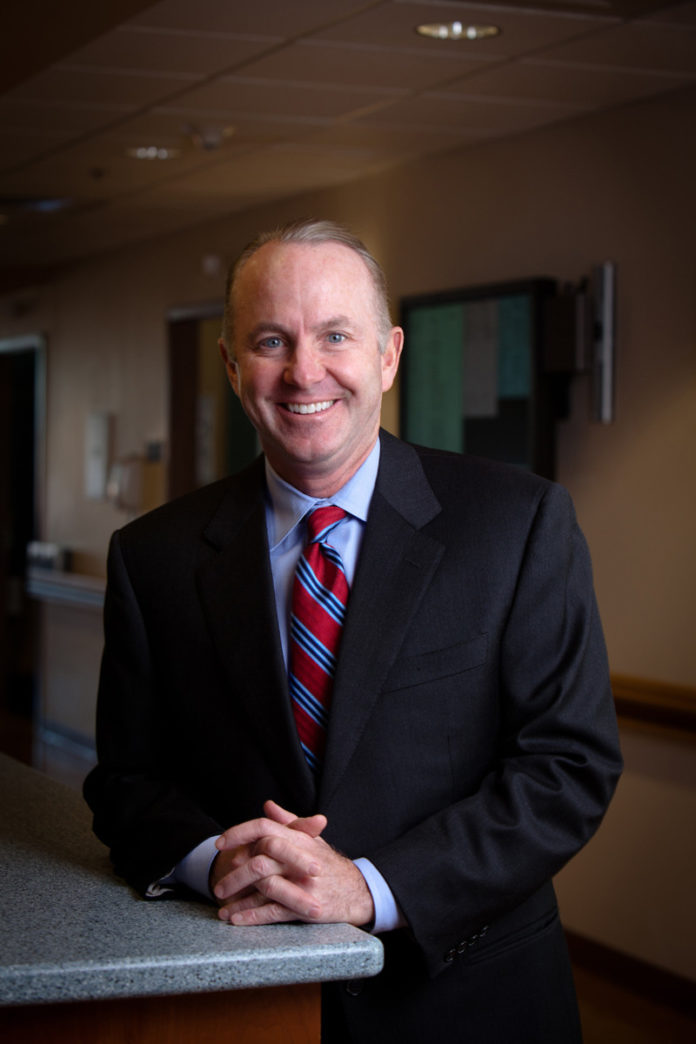
A recent round of layoffs and a projected $12 million operating loss for fiscal 2014 – the first such loss in more than 10 years – might send the average CEO reeling. But Dr. Timothy Babineau, president and CEO of Lifespan, isn’t your average executive.
Babineau, who served as president and CEO of Rhode Island Hospital and The Miriam Hospital before taking the reins at Lifespan, says the health care industry is undergoing unprecedented change, and the health care system is right in the middle of it.
“Every academic medical center in the country is facing serious challenges, as the cost of supporting the training of the physician workforce and the continued nurturing of our research activities are challenged by understandable concerns about the cost of care,” said Babineau, who was appointed CEO in 2012. “The actions we are undertaking now are intended to simultaneously change the way we do business while protecting our historic mission.”
Because of such stiff financial concerns, Babineau has faced many difficult decisions over the first year of his Lifespan tenure, and he has done so head on. He says Lifespan’s mission to be the leading academic health system in the state and region has not – and will not – waver.
“We are confronting major systemic changes in care delivery in our state,” Babineau said. “More care is being driven outside the hospital setting, and we have seen a sizable drop in the need for inpatient services statewide. At the same time, due in no small measure to a weak economy, we have witnessed a dramatic spike in care provided to patients who cannot afford to pay. The elimination of state support for our safety net function has also had an impact on our financial performance.”
In response, Lifespan launched the Lifespan Organizational Restructuring Initiative to identify opportunities to streamline processes and lower its expense profile. A comprehensive review of all of its expenses and how the system delivers care, the initiative has a target of achieving $150 million in expense reductions.
“Every aspect of what we do is under scrutiny so that we may eliminate redundancies and enhance value,” Babineau said. “Management has presented a plan to the board designed to restore financial health and position us to be stronger after this process.”
Lifespan, the state’s largest private employer with more than 12,000 employees, was formed in 1994 by Rhode Island Hospital and its pediatric division, Hasbro Children’s Hospital, and The Miriam Hospital. Today, Lifespan also includes Bradley Hospital, Newport Hospital and Gateway Healthcare. The academic health system is affiliated with Brown University’s Warren Alpert Medical School, with Rhode Island Hospital being the principal teaching hospital for the medical school.
“A business model that has been developed over nearly five decades is being turned upside down very suddenly,” Babineau said. “For years, we have been financially rewarded for the number of interventions we delivered, whether it was lab tests, or admissions, or surgeries or office visits. Now, we are being challenged to develop business models where we will be rewarded for the value of the care we deliver as opposed to the volume of that care. The system is broken and fragmented and unaffordable.”
One of the biggest challenges, according to Babineau, is arriving at a consensus among all the stakeholders in the state of how to appropriately determine the size of the hospital system while striving to make that system more patient-centered and affordable.
“We all want to encourage more primary-care delivery and medical-home models, but those strategies are designed to reduce hospital admissions and more costly care,” Babineau said. “This dynamic will require us to care for fewer patients in the hospital while maintaining the appropriate clinical capacity and necessary economic value from a right-sized hospital system.”
Babineau admits that right now it is difficult to predict the impact that the Affordable Care Act and its expanded coverage will have on hospital finances and the total cost of safety-net services provided in large part by Lifespan’s hospitals. While he hopes that both the expansion of Medicaid and the success of the health-benefits exchange will allow greater numbers of Rhode Islanders to be covered by health insurance, he has concerns.
“Some services previously unpaid for will now be covered; some subsidies paid to hospitals for some safety-net services will be eliminated. How this will help or hurt hospitals is still to be determined at this point. We are watching these trends very carefully,” Babineau said.
But, he says, no matter what changes come along, Lifespan is committed to creating a patient-centric model of care that seamlessly integrates a person’s care no matter where he is cared for within the system.
“We’ve made a conscious decision to move as much care as possible off hospital campuses and into the communities we serve, providing the right care at the right location,” said Babineau, who is spending a lot of his time speaking with Lifespan’s various physician partners and working with them to create new structures that more closely align their practice with the system and that also transform the way the system delivers care.
Cathy Duquette, executive vice president of nursing affairs at Lifespan, says Babineau epitomizes the definition of a team player, describing him as forward thinking, action oriented and inspiring.
“Since Tim arrived, he has articulated an unwavering vision for excellence and created the necessary infrastructure to position Lifespan and its affiliate partners for success in the future in the face of unprecedented change in the external environment,” Duquette said. “His focus on physician alignment and efforts to ensure availability of care and service across the continuum has greatly enhanced our overall efforts to change our focus from volume to value.”
Through everything, Babineau’s commitment remains unflappable, due in great part to his passion. Quite simply, he loves what he does and says it is a privilege to be allowed to lead the region’s largest health care system.
“I draw upon the 20 years that I practiced surgery and provided care at the bedside every day, in this new role,” Babineau said. “Every decision I make is based upon my passion for excellent patient care. and I rely daily on the experiences I had in the trenches caring for patients.
“As I often joke with my dad, I used to be responsible for patients one at a time. Now I’m responsible for them 10,000 at a time. I approach this job very much through the eyes of a physician. Health care is a business, I know. But at the end of the day, our business exists to care for patients,” he said. “We can never lose sight of that.”












